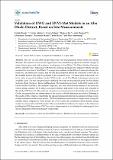Validation of UWG and ENVI-met models in an Abu Dhabi District, based on site measurements
Author(s)
Bande, Lindita; Afshari, Afshin; Al Masri, Dina; Jha, Mukesh; Norford, Leslie Keith; Tsoupos, Alexandros; Marpu, Prashanth; Pasha, Yosha; Armstrong, Peter; ... Show more Show less
DownloadPublished version (5.003Mb)
Terms of use
Metadata
Show full item recordAbstract
The city of Abu Dhabi is growing every year in population, urban extent and energy demand. This research focuses on the application of two simulation programs to estimate changes in urban climate associated with continued development in Abu Dhabi: The Urban Weather Generator (UWG) and ENVI-met. Simulation with these two software packages are validated with the site data measured in downtown Abu Dhabi. A comparison analysis (in the different seasons) between the rural data, the simulation output, and the site measurements shows the variations of the UHI in this Middle Eastern city and the potential of the validated tools. The main aims of this study are: (a) to make a seasonal validation of the UWG for the city of Abu Dhabi (referring to urban-rural available data). The tool was previously validated for a year (no seasonal division) for Abu Dhabi, Toulouse, Basel, Singapore, Rome and Barcelona. The simulations are based on the 2016 version of the Urban Weather Generator. The analysis is separated into three main seasons (instead of the full year): winter, spring, summer. (b) To make a seasonal validation and improve the second tool evaluated in this study, ENVI-met 4.0. The software can simulate urban temperature, humidity and wind speed. Guides are proposed for the enhancement of the accuracy of both estimation procedures. Referring to the results, UWG tends to overestimate the canyon temperature during the summer and has a more realistic estimation on the winter season. ENVI-met has better estimations of temperatures during the summer season compared to UWG. Finally, the UWG weather file contributes a more detailed energy model on a mesoscale model. It considers the seasonal effect and shows the impact of the climate on profiling the UHI phenomena. ENVI-met needs improvement in calculating the anthropogenic heat and in calculation of the mean radiant temperature.
Date issued
2019-08Department
Massachusetts Institute of Technology. Department of ArchitectureJournal
Sustainability
Publisher
MDPI AG
Citation
Bande, Lindita, et al. “Validation of UWG and ENVI-Met Models in an Abu Dhabi District, Based on Site Measurements.” Sustainability 11, 16 (August 2019): 4378. © 2019 The Authors
Version: Final published version
ISSN
2071-1050